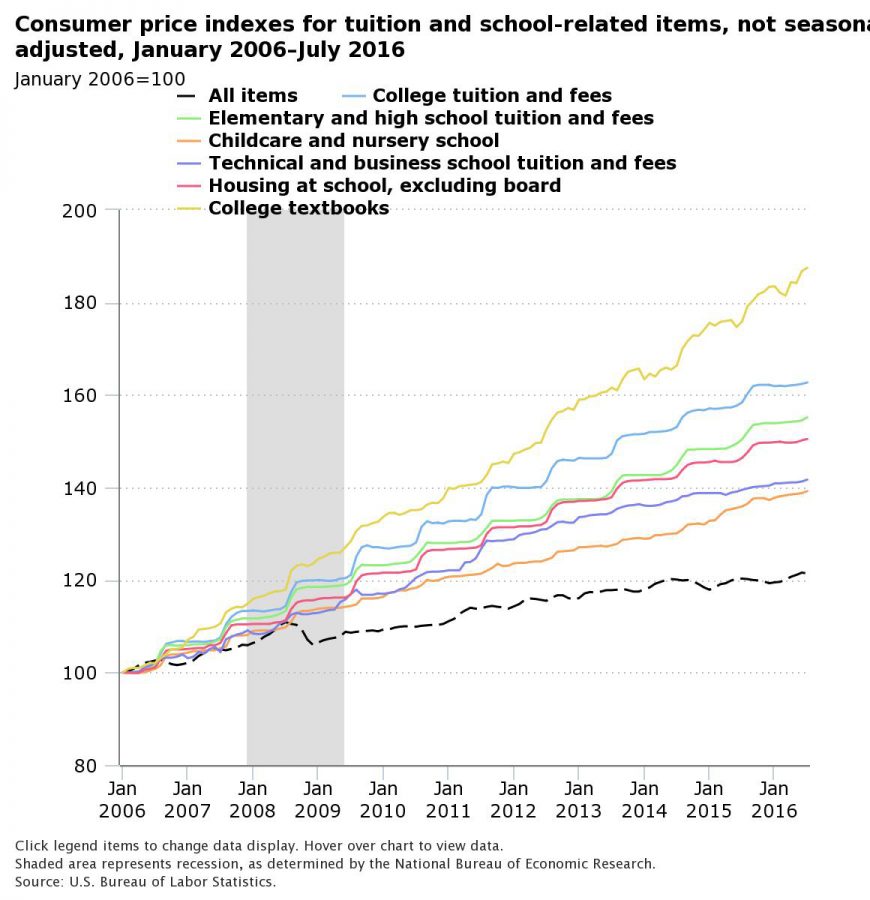UNI tuition to climb for the 2018-2019 school year
BUREAU OF LABOR STATISTICS/Courtesy Photo
According to the Bureau of Labor Statistics, the cost of College Tuition and Fees increased 63 percent (the second highest line) over the last 10 years, eclipsed only by textbook prices (the top line).
Apr 23, 2018
UNI is proposing a 2.8 percent in-state undergraduate tuition increase, according to Lindsay Cunningham from the Office of University Relations.
The proposed increase comes just a month after the Iowa Legislature passed midyear cuts to the University of Iowa and Iowa State University, but spared UNI, which was originally supposed to have a $3.7 million de-appropriation. Even though UNI was held harmless by the bill, the Iowa Board of Regents (BOR) suggested all regent universities increase undergraduate tuition by two to four percent, according to Cunningham.
In-state tuition at UNI for the 2018-2019 school year will be $7,665. A 2.8 percent increase would result in an additional $209 per year in tuition.
UNI’s tuition rate is the lowest of the three regent universities in Iowa, with in-state tuition for 2018-2019 at the University of Iowa (UI) being $8,964 and $8,546 at Iowa State (ISU), according to UI and ISU’s websites.
According to The Project on Student Debt, in 2008, Iowa university and college graduates had the second highest amount of debt in the United States averaging $28,000. Data collected by UNI shows the average UNI graduate had $24,000 in loans in 2008.
“We know higher education is an investment for Iowa students and their families; we strive to keep costs low,” said Michael Hager, senior vice president for finance and operations.
UNI has implemented various programs to remedy the increased costs of tuition.
The Live Like A Student (LLAS) program was implemented in 2010 to help borrowers create healthy spending habits through a financial plan tailored to student needs. LLAS hosts various programs such as borrowing seminars, private loan counseling and transfer student counseling.
Education majors also have exclusive access to further tuition assistance through the Office of Financial Aid.
Education majors can apply for Teacher Education Assistance for College and Higher Education (TEACH) grants. Eligible students can receive up to $4,000 in grants per year if they intend to teach in low income schools after graduating. One-fifth of all students pursuing Bachelors of Arts degrees are education majors, according to President Nook.
Despite rising tuition costs, Nook has signaled his wishes for increased enrollment at UNI.
“As we move forward, and in this next year, enrollment management will continue to be a high priority for us,” Nook said in a recent statement to the BOR, as reported by the Courier. “Continuing to build our enrollment is important to the University, especially with out-of-state students as we move through the current economic issues in the state.”
The BOR held the first of its two hearings on the proposed tuition increases on April 11 and 12. They are expected to announce a decision by early June.














